All Access DNA
Want to know more about your DNA? Curious about how your genes impact your health? All Access DNA honestly answers the questions you have about genetics, healthcare, and popular issues in genomic medicine. Host Kate Wilson utilizes her genetic expertise and experience to interview leaders and specialists in genomic health and research. Join us as we bring you understandable, scientific information about genetics!
Episodes
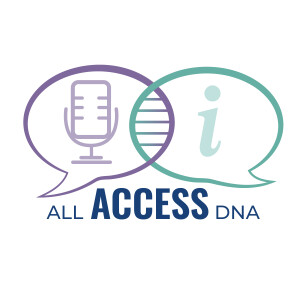
Tuesday Jul 08, 2025
Tuesday Jul 08, 2025
Hey hey DNA! We are celebrating our first season by being nominated for the Podcast Awards! Please help us win the title as Best Health Podcast.
Just head over to podcastawards.com and click the blue button that says “Signup to Vote Now” and fill out your info. Then a CRUCIAL step is to check off the box that says “Please consider me as one of the listeners that will be randomly selected to vote on the final slate in August”. This means you, our listener, will get to vote in the final round of voting!
Once you fill out this info, you will be taken directly to the nominations page. Scroll down to the “Heath” category and select All Access DNA. Then hit save nominations at the bottom of the page. You will have an email asking you to confirm your email address to try to reduce bot votes. So please confirm and that’s it!
I am so thankful for everyone who has listened and checked out the All Access DNA podcast. We are a very small and independent podcast so it means the world to me that you take the time and vote for us in the People’s Choice podcast awards.
Additionally, we are on a break for July so we can gear up for August with new episodes, new updates, and new experts in genetic medicine. Stay subscribed so you don’t miss the next season.
And take a moment to go to podcastawards.com , fill out your info and select All Access DNA in the Health category. It just takes 30 seconds! And thank you, thank you for listening!
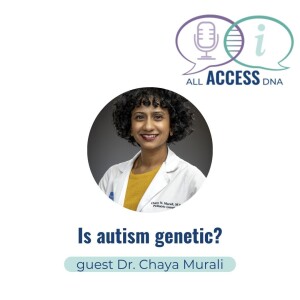
Tuesday Jun 24, 2025
Tuesday Jun 24, 2025
In this conversation, Dr. Chaya Murali discusses the importance of understanding autism, the role of genetic testing, and the impact of misinformation surrounding vaccines and autism. She emphasizes the need for families to seek reliable resources and support while navigating the complexities of neurodivergence. The conversation also highlights the emotional aspects of parenting children with autism and the importance of empathy in medical practice.
Key Takeaways:
Many genetic conditions can co-occur with autism, highlighting the need for genetic evaluations.
Autism is partially genetic, but environmental factors also play a role.
Current genetic testing can identify a known genetic cause in about 30% of autism cases.
The rise in autism diagnoses may be due to better awareness and changes in diagnostic criteria.
Boys are diagnosed with autism more frequently than girls, but this may change as awareness grows.
Genetic testing for autism is not predictive or diagnostic.
Misinformation about vaccines continues to circulate despite evidence showing that vaccines do not cause autism
Dr. Chaya Murali is a pediatric geneticist and personal essayist in Houston, TX. Her clinical focus includes general genetics and skeletal dysplasias, and her research focus includes quality of life and lived experiences among people with rare disease and their families. She has cultivated a special interest in science communication, particularly around the genetics of autism in particular and human genetics in general. Dr. Murali's personal essays can be found at www.chayanautiyalmurali.com, and she can be found occasionally Instagramming @AkkasHouse
Please subscribe to this podcast on Apple Podcasts, Spotify, YouTube or wherever you get your podcasts to stay updated on new episodes of All Access DNA. Listen to past episodes on your favorite podcast play by searching “All Access DNA” or by streaming from our website at allaccessdna.podbean.com
Here are more resources related to today’s topic:
“Handing the pen to the patient: Reflective writing for children and families affected by genetic conditions” by Chaya Murali, Susan D Fernbach, Lorraine Potocki
SPARK for Autism Research
Autism Foundation
Autistic Self Advocacy Network (ASAN)
The Color of Autism Foundation
Any inquiries on the podcast can be sent to AllAccessDNA@gmail.com
Note that this podcast is for entertainment and education and is not intended to be a substitute for professional medical advice. Please consult your physician with any questions you may have regarding your health.
The All Access DNA team includes: host, producer and editor Kate Wilson. The logo is designed by Designs by NKJ.
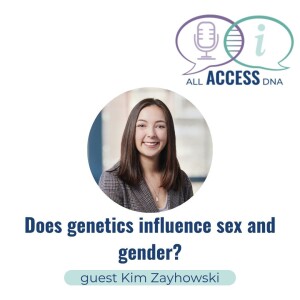
Tuesday Jun 17, 2025
Tuesday Jun 17, 2025
In this conversation, Kim Zayhowski discusses the distinctions between sex and gender, emphasizing that sex is biological while gender is a social construct. She explores the complexities of chromosomes, the fluidity of gender identity, and the implications of societal norms on individual expression. The discussion also touches on the weaponization of scientific terminology in policy-making, the intersection of transphobia and misogyny, and the importance of recognizing diverse gender identities. Zayhowski advocates for active allyship and resistance against discriminatory policies, highlighting the importance of empathy and understanding in fostering a more inclusive society.
Key Takeaways:
Sex and gender are not interchangeable terms.
Biological sex is complex and not binary.
Gender identity is shaped by culture and personal experience.
Cisgender individuals have a gender identity that matches their assigned sex at birth.
Scientific misconceptions can be weaponized in policy-making.
Transphobia is often rooted in misogynistic beliefs.
Healthcare policies must respect bodily autonomy for all individuals.
Inclusive language is essential in healthcare discussions.
Kim Zayhowski is a genetic counselor, researcher, and assistant professor at Boston University Chobanian & Avedisian School of Medicine. She earned her Master’s in Human Genetics and Genetic Counseling from Stanford University School of Medicine. Her research focuses on the intersection of LGBTQIA+ care and genetics.
Please subscribe to this podcast on Apple Podcasts, Spotify, Amazon Music, YouTube or wherever you get your podcasts to stay updated on new episodes of All Access DNA. Listen to past episodes on your favorite podcast play by searching “All Access DNA” or by streaming from our website at allaccessdna.podbean.com
Here are more resources related to today’s topic:
Episode 22 with Kaitlyn Brown- What are sex trait variations and how do we support intersex individuals?
Tested podcast about sex testing in elite sports from NPR
Book, Sex Itself by Sarah S Richardson
Bridging the gap: Time to integrate sex and gender differences into research and clinical practice for improved health outcomes by Roberta Gualtierotti
Any inquiries on the podcast can be sent to AllAccessDNA@gmail.com
Note that this podcast is for entertainment and education and is not intended to be a substitute for professional medical advice. Please consult your physician with any questions you may have regarding your health.
The All Access DNA team includes: host, producer and editor Kate Wilson. The logo is designed by Designs by NKJ.
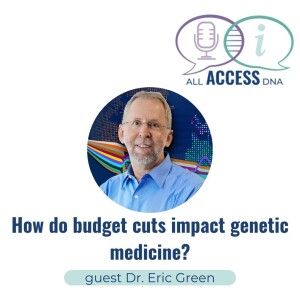
Tuesday Jun 10, 2025
Tuesday Jun 10, 2025
In this conversation, Eric Green discusses the role of the National Human Genome Research Institute (NHGRI) in leading the Human Genome Project and advancing genomic research. He shares his journey at NHGRI, highlighting the significant progress made in genomic medicine, including the All of Us Research Program, which aims to collect genomic and health data from a diverse population. Dr. Green emphasizes the importance of public sector involvement in data sharing and the challenges faced in genomic research. He also addresses the potential impact of funding cuts on future research initiatives. Dr. Green discusses the importance of public advocacy for genomics research and the need for a more equitable approach to genomic medicine. We highlight the growing relevance of genomics in healthcare and the necessity for better public understanding and communication of genomic information.
Key Takeaways:
The NHGRI was established to lead the Human Genome Project.
Genomic information can improve disease diagnosis and treatment.
The cost of sequencing a human genome has drastically decreased.
The All of Us Research Program aims to collect genomic and health data from a million participants.
Public sector involvement is crucial for data sharing in genomics.
Funding cuts to NIH could severely impact genomic research initiatives.
There is a risk of losing a generation of young scientists due to current policies.
Healthcare professionals need to be equipped to discuss genomics with patients.
The future of genomic medicine depends on continued research and public engagement.
Dr. Eric Green is a genomics researcher, Human Genome Project participant, and former Director of the National Human Genome Research Institute (NHGRI) at the U.S. National Institutes of Health (NIH). He was the third NHGRI Director, having been appointed by NIH Director Dr. Francis Collins in 2009. He served as NHGRI Director from 2009 to 2025.
Dr. Green was at NHGRI for over 30 years, during which he was appointed to multiple key leadership positions prior to becoming the NHGRI Director. This included serving as the NHGRI Scientific Director for 7 years, Chief of the NHGRI Genome Technology Branch for 13 years, and Founding Director of the NIH Intramural Sequencing Center for 12 years.
For just over two decades, Dr. Green directed an independent research program that included integral start-to-finish roles in the Human Genome Project, groundbreaking work on mapping, sequencing, and comparing mammalian genomes, and key discoveries about the genes involved in several rare genetic diseases.
Dr. Green earned his M.D. and Ph.D. degrees in 1987 from Washington University in St. Louis; coincidentally, the word “genomics” was coined in that same year. Throughout his career, he has authored and co-authored over 395 scientific publications. Dr. Green has earned multiple honors and awards, including election to the National Academy of Medicine in 2023.
Following his greater than 30 years of public service as a federal employee at NHGRI and NIH, Dr. Green is now using his extensive experience in leading government-funded research programs to foster the expansion of genomics in academia, healthcare, and everyday life.
Please subscribe to this podcast on Apple Podcasts, Spotify, YouTube or wherever you get your podcasts to stay updated on new episodes of All Access DNA. Listen to past episodes on your favorite podcast play by searching “All Access DNA” or by streaming from our website at allaccessdna.podbean.com
Here are more resources related to today’s topic:
National Human Genome Research Institute (NHGRI)
National Institutes of Health (NIH)
All of Us Research Program
The Human Genome Project by Francis Collins and Leslie Fink
Science impacts from recent limitation efforts from current administration:
Do you remember the Human Genome Project? I’m not sure the Trump administration wants you to
Trump’s proposed budget would mean ‘disastrous’ cuts to science
Scientific Research is Getting Cut—and That Should Scare All Americans
Cuts to science agencies undermine hope for American health and economies from the American Society for Biochemistry and Molecular Biology
PBS News Hour- Scientists sound the alarm on Trump administration’s dismantling of research funding
Ways to make your voice heard on saving science and genomics
Contact your representative
Share your support for science on social media, engage in conversations with friends and family, and participate in local town halls
Advocate for individuals who support science and evidence-based decision-making in federal agencies
The Bethesda Declaration: A Call for NIH and HHS Leadership to Deliver on Promises of Academic Freedom and Scientific Excellence
Any inquiries on the podcast can be sent to AllAccessDNA@gmail.com
Note that this podcast is for entertainment and education and is not intended to be a substitute for professional medical advice. Please consult your physician with any questions you may have regarding your health.
The All Access DNA team includes: host, producer and editor Kate Wilson. The logo is designed by Designs by NKJ.
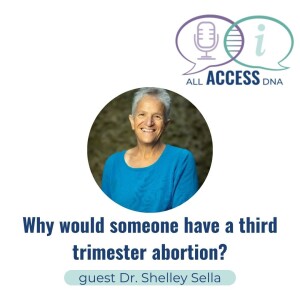
Tuesday Jun 03, 2025
Tuesday Jun 03, 2025
In this conversation, Dr. Shelley Sella discusses her book “Beyond Limits: Stories of Third-Trimester Abortion Care” and her experiences in providing third trimester abortion care. She emphasizes the importance of understanding the circumstances that lead individuals to seek such care, the emotional and psychological aspects involved, and the need for compassionate support. The discussion also touches on the legal implications surrounding abortion, the safety of the procedures, and the necessity for empathy and understanding in the healthcare system.
Key Takeaways:
Third-trimester abortion care is often stigmatized and misunderstood.
The emotional and spiritual aspects of care are integral to the process.
Legal restrictions are increasing, making access to care more difficult.
Support systems are crucial for patients undergoing these procedures.
Abortion is far safer than continuing a pregnancy in many cases due to the high maternal mortality rate in the United States
The stories of patients can help demystify and destigmatize the procedure.
Dr. Shelley Sella is a retired Board Certified Ob-Gyn and the first woman to openly provide third trimester abortion care in the United States. For 20 years Dr. Shelley Sella – an OB-GYN and the first woman to openly provide third-trimester abortion care in the United States – saw patients whose diverse backgrounds and circumstances led them to the same difficult decision: to end their pregnancies. Now, in her beautifully written and compassionate first book BEYOND LIMITS: Stories of Third-Trimester Abortion Care (June 3, 2025; Beacon Press; $27.95), Dr. Sella shares deeply intimate, profoundly human stories of this widely misunderstood experience. Combining candid memoir with expert account, Sella interweaves her patients’ stories with her own personal and professional journey (including her mentorship under Dr. George Tiller) to reveal why she dedicated her life to this work.
Please subscribe to this podcast on Apple Podcasts, Spotify, YouTube or wherever you get your podcasts to stay updated on new episodes of All Access DNA. Listen to past episodes on your favorite podcast play by searching “All Access DNA” or by streaming from our website at allaccessdna.podbean.com
Check out our Patreon at patreon.com/allaccessdna and consider donating to get bonus content, submit questions for our guests, and connect with other genetic-curious individuals.
Here are more resources related to today’s topic:.
Purchase book at bookstore.org
Remembering Dr. George Tiller
Los Angeles Times piece from 2015 on Dr. Susan Robinson
Information on midwifery from WHO
Overturning of Roe v Wade from NPR
Southwestern Women’s Options
Website to share stories about abortion from the National Abortion Federation
Article on the high maternal mortality rate in US
The Turnaway Study that describes the mental health, physical health, and socioeconomic consequences of receiving an abortion compared to carrying an unwanted pregnancy to term
Any inquiries on the podcast can be sent to AllAccessDNA@gmail.com
Note that this podcast is for entertainment and education and is not intended to be a substitute for professional medical advice. Please consult your physician with any questions you may have regarding your health.
The All Access DNA team includes: host, producer and editor Kate Wilson. The logo is designed by Designs by NKJ.

Tuesday May 27, 2025
Tuesday May 27, 2025
This is a replay of our bonus episode that was released on March 28, 2025 and prior to Regeneron Pharmaceuticals purchasing 23andMe. Regeneron entered the asset purchase agreement on May 19, 2025 and states it plans to maintain the consumer genetics business. Regeneron also stated it would prioritize the privacy, security and ethical use of 23andMe's customer data. See more about the announcement here.
In this episode, we explore the complexities of genetic data privacy, particularly in light of 23andMe's recent bankruptcy filing. Anya Prince discusses the implications for customer data, the legal protections in place, and the unique risks associated with genetic information. The discussion also covers the challenges of data de-identification, customer rights regarding data deletion, and the potential for data breaches. The conversation concludes with reflections on the global landscape of genetic data privacy and the importance of understanding personal values in relation to data sharing.
Key Takeaways:
23andMe's bankruptcy raises concerns about customer data.
New ownership of 23andMe or its data could change how genetic data is used.
Security breaches pose significant risks to genetic data.
Global laws on data privacy vary significantly.
Understanding personal values is crucial in data sharing decisions.
Anya Prince, Professor of Law, Joseph F. Rosenfield Fellow in Law
Professor Prince’s teaching and research interests explore health and genetic privacy, with a particular focus on genetic discrimination, the health privacy implications of big data, and the ethical, legal, and social implications of genomic testing. Her research particularly explores the intersections of social and biological data by interrogating the ethical and legal implications of how genetic data can be used to predict social traits and behaviors and, conversely, how social data can be used to predict medical information, including reproductive information. Her interdisciplinary work has been published in legal, bioethics, and medical journals, including the Boston College Law Review, North Carolina Law Review, Iowa Law Review, JAMA, the American Journal of Bioethics, Journal of Law, Medicine, and Ethics, and Genetics in Medicine.
In 2022, she was awarded a four-year R01 grant from the National Human Genome Research Institute (NHGRI) at the National Institutes of Health (NIH) to study the ethical, legal, and social implications of sociogenomic polygenic scores. In 2023, she was awarded a Bridging Bioethics, Research & Policymaking grant from the Greenwall Foundation to develop resources regarding state-level genetic privacy legislation. In addition to these grants, Professor Prince is an investigator, consultant, or advisory board member on multiple other NIH-funded projects. She had previously been awarded a Pathway to Independence Award (K99/R00) from NHGRI to examine the use of genetic information by life, long-term care, and disability insurers.
Professor Prince is a former Visiting Assistant Professor of Law at Indiana University’s Robert H. McKinney School of Law, where she taught Employment Law and Genetics and the Law. Before joining the legal academy, she served as a Post-doctoral Research Fellow at the UNC Center for Genomics and Society (CGS) in the Department of Social Medicine at UNC-Chapel Hill School of Medicine. Professor Prince has also worked as a Skadden Fellow and Staff Attorney at the Cancer Legal Resource Center in Los Angeles, California.
You can follow her @anyaprince.bsky.social
Please subscribe to this podcast on Apple Podcasts, Spotify, YouTube or wherever you get your podcasts to stay updated on new episodes of All Access DNA. Listen to past episodes on your favorite podcast play by searching “All Access DNA” or by streaming from our website at allaccessdna.podbean.com
Check out our Patreon at patreon.com/allaccessdna and consider donating to get bonus content, submit questions for our guests, and connect with other genetic-curious individuals.
Here are more resources related to today’s topic:
Press Release from 23andMe about Voluntary Chapter 11 Initiation
23andMe Privacy Information
California Attorney General Consumer Alert 23andMe
HIPAA Information from US Department of Health and Human Services
SNP genotyping: technologies and biomedical applications
Article from Slate on GEDMatch being Acquired by Verogen
Article from BBC News on 23andMe Profiles Being Hacked
What is GDPR from gdpr.edu
Any inquiries on the podcast can be sent to AllAccessDNA@gmail.com
Note that this podcast is for entertainment and education and is not intended to be a substitute for professional medical advice. Please consult your physician with any questions you may have regarding your health.
The All Access DNA team includes: host, producer and editor Kate Wilson. The logo is designed by Designs by NKJ.
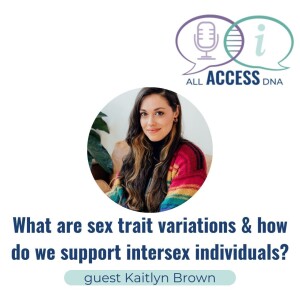
Tuesday May 20, 2025
Tuesday May 20, 2025
In this conversation, we delve into the complexities surrounding intersex and transgender identities, focusing on medical ethics and the importance of patient autonomy. Our guest, Kaitlyn Brown, discusses their advocacy for the intersex community, emphasizing the importance of trauma-informed care in healthcare settings. We talk about the differences between intersex and transgender identities, the prevalence of intersex conditions, and the challenges faced by parents of intersex children. The discussion highlights the complexity of genetic definitions and the need for better understanding and support within the healthcare system. It highlights the ongoing legislative challenges that threaten the rights and healthcare access of these communities, while also emphasizing the need for advocacy and allyship.
Key Takeaways:
Intersex conditions encompass a wide range of biological variations.
Parents need support in navigating intersex diagnoses.
Genetic definitions of intersex are complex and varied.
Healthcare providers must approach intersex care with sensitivity.
Surgical interventions for intersex individuals are controversial and complex.
Patient autonomy is crucial in medical decisions regarding gender assignment.
Legislation is increasingly targeting transgender and intersex communities.
Inclusive conversations about sex and gender are essential in healthcare.
Cisgender individuals can use their privilege to advocate for intersex and transgender rights.
Kaitlyn Brown is a certified genetic counselor from New Zealand who is endosex and identifies as a genderqueer femme, assigned female at birth. Currently a laboratory genetic counselor specializing in cell-free DNA prenatal screening, Kaitlyn has been an active advocate for the intersex community/ people with differences of sexual development and assisted in care management as a former pediatric genetic counselor and researcher. They have been involved with passing government initiatives to legislate awareness and understanding of differences of sex development for healthcare professionals and others who care for this community. Given the history of harmful practices performed on intersex and gender diverse people, Kaitlyn uses a trauma-informed lens to educate about sex development and incorporate both sex- and gender- diverse experiences and needs. They can be found on Bluesky as geneticsbtb.bsky.social
Please subscribe to this podcast on Apple Podcasts, Spotify, YouTube or wherever you get your podcasts to stay updated on new episodes of All Access DNA. Listen to past episodes on your favorite podcast play by searching “All Access DNA” or by streaming from our website at allaccessdna.podbean.com
Here are more resources related to today’s topic, genetic counselors.
InterACT- Advocates for Intersex Youth
Sambia culture of Papua New Guinea and “turnim-man”
Trauma Informed Care
Intersex Justice Project
Strategy Lab for Intersex Movements (SLIM)
InterConnect Support
Tested podcast about sex testing in elite sports from NPR
Book, Sex Itself by Sarah S Richardson
Any inquiries on the podcast can be sent to AllAccessDNA@gmail.com
Note that this podcast is for entertainment and education and is not intended to be a substitute for professional medical advice. Please consult your physician with any questions you may have regarding your health.
The All Access DNA team includes: host, producer and editor Kate Wilson. The logo is designed by Designs by NKJ.
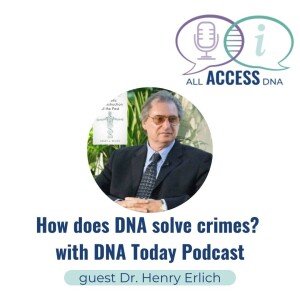
Tuesday May 13, 2025
Tuesday May 13, 2025
We are featuring an episode from another podcast on Gene Pool Media, DNA Today. True crime dominates the podcasting world, but what about the genetic aspects behind these cases? In this episode of DNA Today, we dive into the pivotal role of DNA in forensic science with Dr. Henry Erlich, a pioneer in DNA analysis and a key figure in developing polymerase chain reaction (PCR) technology. His work has transformed the criminal justice system, from solving cases to overturning wrongful convictions.
Dr. Henry Erlich has authored over 450 publications and spent decades applying DNA analysis to criminal investigations, missing persons cases, and ancestry research. His lab performed the first DNA case in the US and, in 1988, the first DNA exoneration. Erlich was the Director of the Department of Human Genetics and Vice-President of Discovery Research for Roche Molecular Systems, Inc until 2013. He is currently a Senior Scientist at Benioff Children’s Hospital Oakland Research Institute.
After reading his book Genetic Reconstruction of the Past, I had countless questions about how PCR reshaped the justice system, its impact on exonerations, and the ethical implications of forensic DNA databases.
Trigger Warning: This episode contains discussions of murder and sexual assault, which may not be suitable for young listeners.
Key Takeaways:
The development of PCR technology and its revolutionary impact on forensic genetics
How PCR outperformed older methods like RFLP in criminal case investigations
Pennsylvania vs. Pestinikas (1986), the first criminal case using DNA analysis
Key forensic DNA terms explained: inclusion, match, exclusion, and random match probability
The role of DNA evidence in exonerations and wrongful convictions
How forensic labs analyze DNA from multiple individuals at crime scenes
The establishment of the FBI’s National DNA Index System (NDIS) and who is included
The ethical concerns surrounding partial DNA matches and familial searching
How public DNA databases like GEDmatch helped identify the Golden State Killer
Dr. Erlich’s insights into the O.J. Simpson case and its impact on public perception of forensic DNA
Resources and Links:
Read Genetic Reconstruction of the Past by Dr. Henry Erlich
Explore the National DNA Index System (NDIS) and CODIS
The Innocence Project: Fighting wrongful convictions with DNA evidence
GEDmatch and its role in forensic investigations
Please subscribe to All Access DNA and DNA Today on Apple Podcasts, Spotify, YouTube or wherever you get your podcasts to stay updated on new episodes. Listen to past episodes on your favorite podcast play by searching “All Access DNA” or by streaming from our website at allaccessdna.podbean.com
Check out our Patreon at patreon.com/allaccessdna and consider donating to get bonus content, submit questions for our guests, and connect with other genetic-curious individuals.
Any inquiries on the podcast can be sent to AllAccessDNA@gmail.com
Note that this podcast is for entertainment and education and is not intended to be a substitute for professional medical advice. Please consult your physician with any questions you may have regarding your health.
DNA Today is hosted and produced by Kira Dineen, MS, LCGC, CG(ASCP)CM . Our Video Lead is Amanda Andreoli. Our Social Media Lead is Kajal Patel. Our Outreach Intern is Liv Davidson. And our logo Graphic Designer is Ashlyn Enokian, MS, CGC. The All Access DNA team includes: host, producer and editor Kate Wilson. The logo is designed by Designs by NKJ.
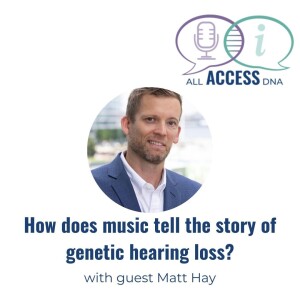
Tuesday May 06, 2025
Tuesday May 06, 2025
In this episode, Kate talks to Matt Hay about is book, “Soundtrack of Silence”. Matt opens up about his experience with neurofibromatosis type 2 (NF2), a genetic condition that led to profound hearing loss- and ultimately, the creation of his memoir, “Soundtrack of Silence: Love, Loss, and a Playlist for Life”. We explore his and his wife’s journey with IVF and preimplantation genetic testing, how they faced life-changing diagnoses together, and why his wife is the true hero of his story. Matt tells us how music shaped his life and how he continues to connect with it after hearing loss, the emotional impact of NF2, and the one song that defines his life today.
Matt Hay (IU MS’99, MBA’09, DrPH’26) has a long journey toward deafness and even longer journey toward learning to “hear” again with an experimental brainstem implant. Now an global in-demand keynote speaker, he first publicly shared his story on a National Public Radio (NPR) podcast titled Soundtrack of Silence. The intimate, funny and authentic peek at what it’s like to start a career, fall in love and build a life while battling a rare disease inspired actor Channing Tatum and Paramount Pictures to option the motion picture rights to Matt’s life story. Matt’s memoir Soundtrack of Silence was released in 2024 by St. Martin’s Press, an imprint of Macmillan. Publishers Weekly said Hay’s “moving memoir makes magic out of facing the music” and it immediately earned a spot as an Amazon Best Seller within the Disability Category.
When Matt isn’t adding tracks to the soundtrack of his life, he passionately supports thehearing loss community as a member of the Columbia University Genetic Counseling Advisory Board and previously as a consultant to the St. Joseph Institute for the Deaf. He proudly served as a Congressional lobbyist for neurofibromatosis (NF) research funding, the genetic disorder that caused his hearing loss, and has raised money for NF research by doing endurance events, including an Ironman Triathlon and the Boston Marathon. He didn’t win either one.
Matt currently serves the rare disease community as the US Director of Advocacy for a global biopharmaceutical company and is a doctoral candidate at the Indiana University School of Public Health with a focus on global health leadership. He lives in Westfield, Indiana, with his wife (whom he’s quick to point out is the hero of his story) and three children.
Please subscribe to this podcast on Apple Podcasts, Spotify, YouTube or wherever you get your podcasts to stay updated on new episodes of All Access DNA. Listen to past episodes on your favorite podcast play by searching “All Access DNA” or by streaming from our website at allaccessdna.podbean.com
Check out our Patreon at patreon.com/allaccessdna and consider donating to get bonus content, submit questions for our guests, and connect with other genetic-curious individuals.
Here are more resources related to today’s topic:
Findageneticcounselor.org to search for a genetic counselor near you
But Matt’s book on Bookshop.org HERE
Info on NF2 from National Organization for Rare Disorders
American Society for Reproductive Medicine
Any inquiries on the podcast can be sent to AllAccessDNA@gmail.com
Note that this podcast is for entertainment and education and is not intended to be a substitute for professional medical advice. Please consult your physician with any questions you may have regarding your health.
The All Access DNA team includes: host, producer and editor Kate Wilson. The logo is designed by Designs by NKJ.

Tuesday Apr 29, 2025
Tuesday Apr 29, 2025
In this conversation, Barry Tong discusses the complexities of cancer genetics, emphasizing the intersection of genetic factors and public health. He explains how cancer arises from both genetic predispositions and environmental influences, and the importance of personalized risk assessments. The discussion also highlights the role of family history in cancer risk, and the challenges faced by patients navigating a cancer diagnosis, and the need for accessible genetic services in underserved communities.
Key Takeaways:
Public health aspects are crucial in understanding cancer.
Misconceptions about cancer origins can hinder patient understanding.
Personalized risk assessments are essential for effective cancer prevention.
Polygenic risk scores are emerging tools for assessing cancer risk.
Access to genetic services is crucial for underserved populations.
Barry Tong is a currently a genetic counselor supervisor at the UCSF Health Cancer Genetics and Prevention Program. Previously, Barry held several medical affairs and sales roles at Myriad Genetic Laboratories, and is a graduate of the University of Michigan Genetic Counseling and Public Health dual degree program. He is passionate about equitable access to genetics services, genetic counselor education and mentoring, and ensuring diverse and equitable entry into the genetic counseling profession.
Please subscribe to this podcast on Apple Podcasts, Spotify, YouTube or wherever you get your podcasts to stay updated on new episodes of All Access DNA. Listen to past episodes on your favorite podcast play by searching “All Access DNA” or by streaming from our website at allaccessdna.podbean.com
Check out our Patreon at patreon.com/allaccessdna and support our independent podcast to get bonus content, submit questions for our guests, and connect with other genetic-curious individuals.
Here are more resources related to today’s topic:
What is a polygenic risk score? From National Human Genome Research Institute
Wisdom study with the goal to change the way breast cancer is detected and risk is reduced
Find A Genetic Counselor from NSGC.org
Multifactorial and Complex Disorders
Episode 14- Colon Cancer: What is Lynch syndrome?
Episode 12- Who has surgery to prevent colon cancer?
Episode 7- Are leukemia and lymphoma hereditary?
Any inquiries on the podcast can be sent to AllAccessDNA@gmail.com
Note that this podcast is for entertainment and education and is not intended to be a substitute for professional medical advice. Please consult your physician with any questions you may have regarding your health.
The All Access DNA team includes: host, producer and editor Kate Wilson. The logo is designed by Designs by NKJ.

All Access DNA
What is DNA anyway? Should I consider genetic testing? Can my genes tell me how long I will live? All Access DNA answers the questions you have about genetics, healthcare, and popular issues in precision medicine as it relates to our daily lives. We may even veer into territory that is no longer science fiction but science reality. Host Kate Wilson utilizes her genetic expertise and experience to interview leaders and specialists in genomic medicine and research. Join us as we empower everyone to know more about DNA in an entertaining format. New Episodes Every Tuesday!








